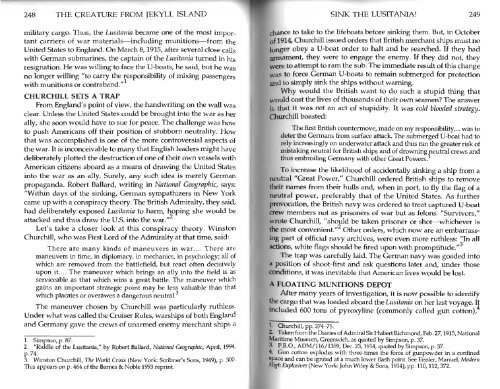Create successful ePaper yourself
Turn your PDF publications into a flip-book with our unique Google optimized e-Paper software.
248 THE CREATURE FROM JEKYLL ISLAND SINK THE LUSTTANIA! 249<br />
military cargo. Thus, the Lusitania became one of the most important<br />
carriers of war materials—including munitions—from the<br />
United States to England. On March 8, 1915, after several close calls<br />
with German submarines, the captain of the Lusitania turned in his<br />
resignation. He was willing to face the U-boats, he said, but he was<br />
no longer willing "to carry the responsibility of mixing passengers<br />
with munitions or contraband/'<br />
CHURCHILL SETS A TRAP<br />
From England's point of view, the handwriting on the wall was<br />
clear. Unless the United States could be brought into the war as her<br />
ally, she soon would have to sue for peace. The challenge was how<br />
to push Americans off their position of stubborn neutrality. How<br />
that was accomplished is one of the more controversial aspects of<br />
the war. It is inconceivable to many that English leaders might have<br />
deliberately plotted the destruction of one of their own vessels with<br />
American citizens aboard as a means of drawing the United States<br />
into the war as an ally. Surely, any such idea is merely German<br />
propaganda. Robert Ballard, writing in National Geographic, says:<br />
"Within days of the sinking, German sympathizers in New York<br />
came up with a conspiracy theory. The British Admiralty, they said,<br />
had deliberately exposed Lusitania to harm, hoping she would be<br />
attacked and thus draw the U.S. into the war."<br />
Let's take a closer look at this conspiracy theory. Winston<br />
Churchill, who was First Lord of the Admiralty at that time, said:<br />
There are many kinds of maneuvers in war.... There are<br />
maneuvers in time, in diplomacy, in mechanics, in psychology; all of<br />
which are removed from the battlefield, but react often decisively<br />
upon it.... The maneuver which brings an ally into the field is as<br />
serviceable as that which wins a great battle. The maneuver which<br />
gains an important strategic point may be less valuable than that<br />
which placates or overawes a dangerous neutral.<br />
The maneuver chosen by Churchill was particularly ruthless.<br />
Under what was called the Cruiser Rules, warships of both England<br />
and Germany gave the crews of unarmed enemy merchant ships a<br />
1 Sunpson, p. 87.<br />
2. "Riddle of the Lusitania/' by Robert Ballard, National Geographic, AprU, 1994,<br />
p. 74.<br />
3. Winston Churchill, The World Crisis (New York: Scribner's Sons, 1949), p. 300.<br />
This appears on p. 464 of the Barnes & Noble 1993 reprint.<br />
chance to take to the lifeboats before sinking them. But, in October<br />
of 1914, Churchill issued orders that British merchant ships must no<br />
longer obey a U-boat order to halt and be searched. If they had<br />
armament, they were to engage the enemy, If they did not, they<br />
were to attempt to ram the sub. The immediate result of this change<br />
was to force German U-boats to remain submerged for protection<br />
and to simply sink the ships without warning.<br />
Why would the British want to do such a stupid thing that<br />
would cost the lives of thousands of their own seamen? The answer<br />
is that it was not an act of stupidity. It was cold blooded strategy.<br />
Churchill boasted:<br />
The first British countermove, made on my responsibility,... was to<br />
deter the Germans from surface attack. The submerged U-boat had to<br />
rely increasingly on underwater attack and thus ran the greater risk of<br />
mistaking neutral for British ships and of drowning neutral crews and<br />
thus embroiling Germany with other Great Powers. 1<br />
To increase the likelihood of accidentally sinking a ship from a<br />
neutral "Great Power," Churchill ordered British ships to remove<br />
their names from their hulls and, when in port, to fly the flag of a<br />
neutral power, preferably that of the United States. As further<br />
provocation, the British navy was ordered to treat captured U-boat<br />
crew members not as prisoners of war but as felons. "Survivors/'<br />
wrote Churchill, "should be taken prisoner or shot—whichever is<br />
the most convenient."<br />
Other orders, which now are an embarrassing<br />
part of official navy archives, were even more ruthless: "In a)]<br />
actions, white flags should be fired upon with promptitude/<br />
The trap was carefully laid. The German navy was goaded into<br />
a position of shoot-first and ask questions later and, under those<br />
conditions, it was inevitable that American lives would be lost<br />
A FLOATING MUNITIONS DEPOT<br />
After many years of investigation, it is now possible to identify<br />
the cargo that was loaded aboard the Lusitania on her last voyage. It<br />
included 600 tons of pyroxyline (commonly called gun cotton), 4<br />
I Churchill, pp. 274-75.<br />
2. Taken from the Diaries of Admiral Sir Hubert Richmond, Feb. 27, 1915, National<br />
Maritime Museum, Greenwich, as quoted by Simpson, p. 37.<br />
3- P.R.O., ADM/116/1359, Dec. 23, 1914, quoted by Simpson, p. 37.<br />
4. Gun cotton explodes with three-times the force of gunpowder in a confined<br />
space and can be ignited at a much lower flash point. See Eissler, Manuel, Modern<br />
Higt<br />
High Explosives (New York John Wiley & Sons, 1914), pp. 110, 112, 372.


